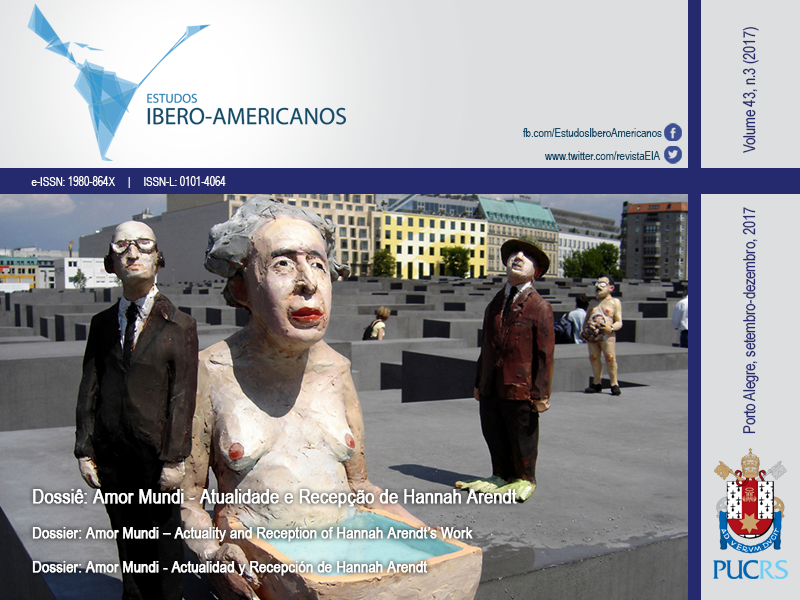Testimony and crimes against humanity from Hannah Arendt's perspective
DOI:
https://doi.org/10.15448/1980-864X.2017.3.25880Keywords:
Testimony, Crime against humanity.Abstract
Considering the emergence of testimony as a fundamental source of history and shared memory after the Second World War, this article intends to discuss the role of testimony in Arendt’s theory, considering, on the one hand, her criticism of the use of testimonies in the Eichmann trial and, on the other hand, the importance narrative, memory and metaphor acquire in her work. This discussion casts a lighton the role of testimonies inhistorical trialsconcerning crimes against humanity.
Downloads
References
ANDRIEU, Kora. La Justice Transitionnelle. Paris: Gallimard, 2012.
ARENDT, Hannah. Eichmann in Jerusalem: A Report on the Banality of Evil. London: Penguin Books, 2006.
______. II/22. In: ______. Journal de Pensée (1950-1073). Paris: Éditions du Seuil, 2005. p. 60-61.
______. XX/25. In: ______. Journal de Pensée (1950-1073). Paris: Éditions du Seuil, 2005. p. 680.
______. The Life of the Mind. New York: Harcourt, Inc., 1978.
______. “Some Questions of Moral Philosophy”. In: ______. Responsibility and Judgment. New York: Schocken Books, 2003.
p. 95.
______. Thinking and Moral Considerations. In: ______. Responsibility and Judgment. New York: Schocken Books, 2003. p. 159-192.
ASSY, Bethania; HOFFMANN, Florian. The faithfulness to the Real: The Heritage of the Losers of History, Narrative, Memory and Justice. In.: ASSY, Bethania; MELO, Carolina de Campos; DORNELLES, João Ricardo; GÓMEZ, José María (Coord.). Direitos Humanos: Justiça, verdade e memória. Rio de Janeiro: Ed. Lumen Juris, 2012. p. 9-29.
BILSKY, Leora. Transformative Justice: Israeli identity on trial. The University of Michigan Press, 2004.
DERRIDA, Jacques. Poétique et politique du témoignage. In: MALLET, Marie-Louise; MICHAUD, Ginette (Dir.). Jacques Derrida – Cahier de l'Herne. Paris: Éditions de l'Herne, 2004. p. 521-539.
DOUZOU, Laurent. Retour sur Le contexte général du procés Barbie. In: TRUCHE, Pierre (Dir.). Juger les crimes contre l'humanité. 20 après le procés Barbie. Lyon: ENS, 2009.
GARAPON, Antoine. Des crimes que l'on ne peut ni punir ni pardoner. Odile Jacob, 2002.
LAFER, Celso. Experiência, ação e narrativa: reflexões sobre um curso de Hannah Arendt. Estudos Avançados, v. 21, n. 60, p. 289-
, 2007. https://doi.org/10.1590/S0103-40142007000 200022
WEIGEL, Sigrid. Poetics as a Presupposition of Philosophy: Hannah Arendt's Denktagebuch. Telos, 146, p. 97-110, 2009. p. 98. WIEVIORKA, Annette. L'Ère du témoin. Paris: Plon, 2002.
Downloads
Published
How to Cite
Issue
Section
License
Copyright (c) 2017 Claudia Perrone-Moisés

This work is licensed under a Creative Commons Attribution 4.0 International License.
Copyright
The submission of originals to Estudos Ibero-Americanos implies the transfer by the authors of the right for publication. Authors retain copyright and grant the journal right of first publication. If the authors wish to include the same data into another publication, they must cite Estudos Ibero-Americanos as the site of original publication.
Creative Commons License
Except where otherwise specified, material published in this journal is licensed under a Creative Commons Attribution 4.0 International license, which allows unrestricted use, distribution and reproduction in any medium, provided the original publication is correctly cited.






